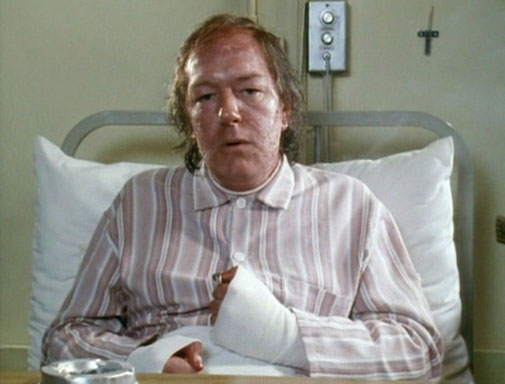
The Singing Detective might not conjure a picture of holiday cheer, but still, it's an essential gift of TV Worth Giving, and certainly one Worth Getting. If you have a quality TV collector on your list who somehow, by some gross omission, doesn't have it as part of his or her home video library, here's your chance. You can give a milestone work of television art, and one that will keep giving, and keep rewarding, with each repeated viewing.
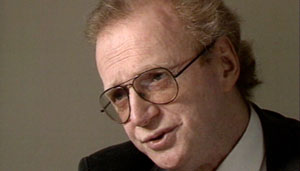
It's no secret that this 1986 British miniseries, written by the late Dennis Potter (who, seen at right, also concocted its equally daring 1978 musical miniseries predecessor, Pennies From Heaven) is an all-time TVWW favorite. Our Fearless Leader, the founder of this website, has written extensively on this peculiar clash of mystery, musical and psychoanalytic thriller. He devoted much of a chapter to it in his book Teleliteracy: Taking Television Seriously in 1992, and even wrote the liner notes on the 2003 DVD release.
(Which, it should be stressed, you can buy HERE, as a gift or for yourself. And should, if you haven't done so already. It's on sale at Amazon for less than $24.)
Make no mistake, the six-episode The Singing Detective is a trippy journey, and a dark one at that. It treads deep into the muck of adultery, betrayal and sickness. But if you stick with it, the payoffs of Potter's psycho-opera are like no other.
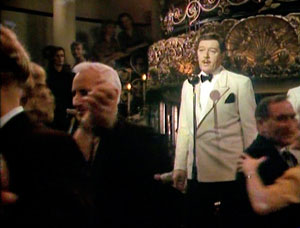
Potter's semi-autobiographical premise drops us into the hospital with pulp fiction writer Philip Marlow. (That's Marlow without the "e," but with an obvious appropriation of Raymond Chandler's hard-boiled private eye from The Big Sleep and other stories.)
The fact that we're getting another character from another writer is the first clue we're not in standard miniseries mode anymore.
And he's not the only Marlow here, either. The other Marlow is the tough-talking, hard-drinking Chandleresque detective in his pulp novel. But while the noir-ish Marlow cracking cases and making the dames, he makes money on the side as -- of all things -- a dancehall singer. Hence the program's title.
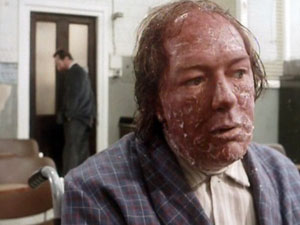
Back in the "real" world, Marlow the author suffers from psoriatic arthropathy (as did Potter in real life), where his joints are painfully crippled, particularly his hands. That's accompanied by another horrid condition, in which his entire skin is flaking off en masse.
It's an off-putting portrait, to be sure, and not just physically. Marlow is a failing, embittered middle-aged writer with his few books now out of print and profitless. He's in debt, bed-ridden at a public hospital ward, and afflicted with what may or may not be hallucinations.
Meanwhile, the other Marlow -- The Singing Detective -- is in full good health, free to explore what may be going on in the novel. Or it just may all be occurring, and expanding, inside the deteriorating mind of Marlow the author.
Michael Gambon stars as the acid-tongued, spiteful Marlow, and it's such an engrossing, multi-tiered performance that Bryan Cranston's work in AMC's Breaking Bad just may be an agonizingly close second fiddle. Gambon is that good.
(And yes, that's the same Gambon who plays Dumbledore in the later Harry Potter movies -- and if you've got the courage to watch Gambon's portrayal of a ham-handed sociopath in 1989's The Cook, the Thief, His WIfe & Her Lover, you'll be amazed, and thoroughly shaken, as by no other acting experience.)
From Marlow the author's hospital bed, his point of view begins to fracture, and it's soon clear he is psychologically splintered as well. He's got a laundry list of poverty and trauma behind him in childhood -- things he shouldn't have seen, not to mention an obvious sexual maladjustment and the ensuing misogyny that has branded him.
He's the grimmest type of antihero, not winning any congeniality awards with the audience, or with his mates in the gray hospital ward.
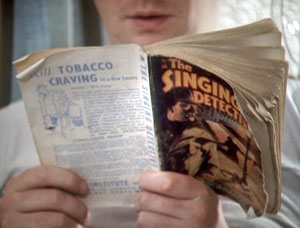
Potter's Singing Detective will take some dedication early on, since Marlow is so dislikable, and we're unsure whether the action we're witnessing is primarily in his pulp novel, his childhood, his head, or someplace else. But as we are curiously lost, its various story lines unravel, then begin to weave together, and the rewards start to come by the second episode.
Most of the volumes written about Potter and The Singing Detective speak to how he, among a generation of modern TV writers, did for the miniseries and television narratives what James Joyce and others did for the novel earlier in the century. As they had done before him, Potter broke apart the conventions of storytelling, shuffling it into a lucid-dreaming, stream-of-consciousness experience -- expanding the genre into something decidedly other.
Potter took full advantage of the television series structure, adapting the pulp novel -- notably, years before Quentin Tarantino -- and building a compelling, but non-natural world. He filled it with dance numbers, mismatched flashbacks, and Freudian symbols that sought to evoke the nature of human experience and the back-washed, sloshy structure of memory.
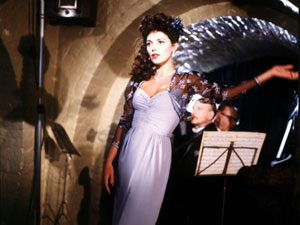
And therein is the genius of Potter's working method: It breaks into four to five plot lines that cross and intertwine, with characters eerily switching costumes, hairstyles, and doubling roles. But with each shift, a new piece of the story is revealed, and in kind, Potter is unmasking his own, hard-won basic truths.
Likewise, as we watch these epiphanies, we can only feel and become acutely aware of that unpeeling -- for the hospitalized Marlow, in the literal sense -- and look to those deeply hidden layers, searching for the origins of who we are.
Even if you quibble with the results, you can't deny the integrity and the ambition of the project.
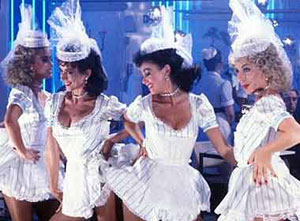
Potter said often that the detective novel was perfect for this approach, where readers expected clues that pointed them to the single solution. In The Singing Detective, Potter always remarked that he wanted an overflow of clues -- points of meaning and contradiction that formed a roadmap to things deep in the psyche -- and few, neat solutions.
Among Potter's many achievements are his disruptive trademark devices, such as characters breaking into lip-synched production numbers, singing to music by dance bands of the 1930s and '40s. Or, just as suddenly and disconcertingly, they begin to speak in sentences that include dictation-like recitation of the screenplay's punctuation: "Comma, dash question mark?"

Potter scored many visual triumphs in the art direction as well. One visual refrain shows Marlow, as a child, in his escapes to the remote forest near his village. He is often seen high in the trees, suspended in green, dangerously above the ground yet nestled safely in a pristine, Eden-like state.
Another, staged perfectly by director Jon Amiel, shows Marlow the patient being wheelchaired to the office of Dr. Gibbon (Bill Paterson), the hospital psychiatrist.
He goes down a ramp into the basement of the hospital. Down he goes, deeper into his illness, and the reasons for it.
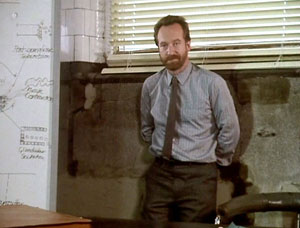
In the basement office, the doctor's head (i.e., the intellect) is clearly shown as above the ground, outside the window as he leans against it. Now, visually split from his body shown below the window sill, it arguably captures Marlow's predicament. He's a writer, and has so intellectualized his dilemma in the world, he's cut off from his feelings, most likely repressed, and is disintegrated and disintegrating as a person.
In that subterranean room, Marlow and the doctor trade remarks with the rapid meter of a furious machine, each trying to catch the other at his game. These are some of the more brilliant, lashing exchanges in the drama, and true indications of Potter's artistry. The music of the language is staccato and brilliant -- and the words cut like blades.
It's worth noting that the somewhat basic 1986 production values, in hindsight, serve to underscore the accomplishment of the writing all the more. Decades later, the dialogue in The Singing Detective remains virtually peerless, and stands apart from any visual accents that might accompany it, no matter the level of technology.
There are moments in The Singing Detective in which Marlow meets Marlow. It's a telling hint of things to come in later modern meta-narratives, as when screenwriter Charlie Kaufman literally drops himself into his screenplay of a writer writing a screenplay in 2002's Adaptation. Or later, as Kaufman's character, playwright Caden Cotard, does in 2008's brilliant Synecdoche, New York.
First broadcast on the BBC in 1986, the series had an initial run in the U.S. on public television in 1988, but only on a station by station basis, and generally after 11 p.m. Its content was deemed too provocative, for its (small amount of) nudity and for its starkly adult language. It has never had a full network run in the United States -- not on PBS, and not on cable, not even on BBC America.
In Great Britain, The Singing Detective completed its initial run 25 years ago this month. It deserves an anniversary tribute -- even if you have to buy a copy to do so yourself, or for a friend.